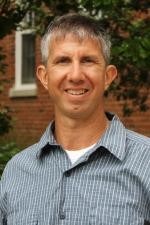Meet Two of Our 2025 Conference Speakers
 Geoff Rinehart has 23 years of experience in the turfgrass and landscape industry. He earned Bachelor’s degrees in Turfgrass Management and Landscape Contracting from Virginia Tech and a Master’s of Science in Turfgrass Science at Michigan State University. After graduating from Michigan State, Geoff spent 5 ½ years as a research technician conducting turfgrass science research at Washington State University and spent 4 years coordinating the Tacoma-Pierce County Natural Yard Care program conducting outreach and education for homeowners and professionals in Pierce County, WA. From 2013-2018 Geoff served as coordinator of the National Arboretum’s ‘Grass Roots’ Initiative, which includes a 1.3- acre interactive turfgrass exhibit, a website, and homeowner lawn maintenance workshops. His experience has also included working on golf courses and in the landscape industry in Maryland, Colorado, Washington state, and Hawaii. Geoff joined the University of Maryland as a Lecturer in July, 2017 teaching courses in landscape and turfgrass management.
Geoff Rinehart has 23 years of experience in the turfgrass and landscape industry. He earned Bachelor’s degrees in Turfgrass Management and Landscape Contracting from Virginia Tech and a Master’s of Science in Turfgrass Science at Michigan State University. After graduating from Michigan State, Geoff spent 5 ½ years as a research technician conducting turfgrass science research at Washington State University and spent 4 years coordinating the Tacoma-Pierce County Natural Yard Care program conducting outreach and education for homeowners and professionals in Pierce County, WA. From 2013-2018 Geoff served as coordinator of the National Arboretum’s ‘Grass Roots’ Initiative, which includes a 1.3- acre interactive turfgrass exhibit, a website, and homeowner lawn maintenance workshops. His experience has also included working on golf courses and in the landscape industry in Maryland, Colorado, Washington state, and Hawaii. Geoff joined the University of Maryland as a Lecturer in July, 2017 teaching courses in landscape and turfgrass management.
Geoff will be presenting Managing Common Disease and Insect Pests in Cool-Season Sports Fields
This presentation will cover some of the most common diseases and insects of sports fields in the transition zone and northern(cool-season) zone. The concepts of the “disease triangle”; how pathogen presence, environmental conditions and grass type play a role in disease development; and basic IPM concepts that are pertinent to disease and insect management will be discussed. For each pest I will discuss the environmental conditions that favor pest development and the pest’s life cycle. IPM concepts emphasizing cultural control practices. Biocontrol options as well as traditional pesticide options will be discussed.
Learning Objectives
 Grady Miller, PhD, is an Extension Specialist and the ENVU Distinguished Professor of Sustainability, at North Carolina State University. During his career, he has taught 74 University course sections and has authored over 750 publications related to turfgrass management. His research activities relate primarily to turfgrass nutrition and water issues, cultivar evaluation, turfgrass colorants, and evaluation of athletic fields. He has been installed in the Academy of Outstanding Faculty Engaged in Extension Outreach at NC State University and a Fellow in the Agronomy Society of America. He is a past SFMA Founders’ Award recipient.
Grady Miller, PhD, is an Extension Specialist and the ENVU Distinguished Professor of Sustainability, at North Carolina State University. During his career, he has taught 74 University course sections and has authored over 750 publications related to turfgrass management. His research activities relate primarily to turfgrass nutrition and water issues, cultivar evaluation, turfgrass colorants, and evaluation of athletic fields. He has been installed in the Academy of Outstanding Faculty Engaged in Extension Outreach at NC State University and a Fellow in the Agronomy Society of America. He is a past SFMA Founders’ Award recipient.
Dr. Miller will be presenting Knowledge Gained from 23 years of Q&A
The Q&A column was started in the SportsTurf magazine in1998. The column was authored by Dr. Dave Minner (Iowa State University) the first two years. In 2000, Dr. Miller joined Dr. Minner and they wrote alternating months until 2014, when Pam Sherratt replace Dr. Minner. Over 24 years of writing these articles have provided Dr. Miller significant opportunities to answer questions presented by sports turf managers. Dr. Miller would like to share with the audience my approach to answering these questions. Where are the experts and what are reliable sources of information? What are spin-off resources that have come from the columns. The presentation will provide a forum to openly ask questions and get answers based on science.
Learning Objectives